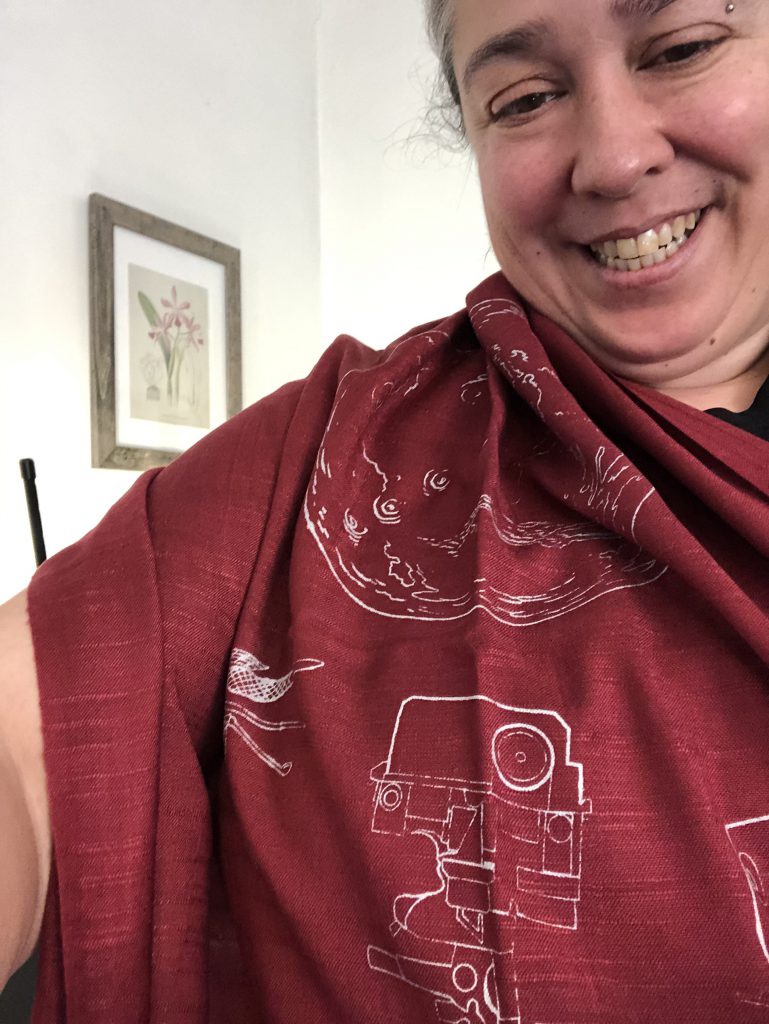Ursula knelt on the uneven surface of sand and rock, putting her tool box down beside her. She paused and considered the robot before beginning to work.
Covering the top of the rover’s main body and extending outward from it, the solar panels were obscured by a thick layer of Mars’s pale red dust. That was where Ursula would begin, with the easier job of clearing the flat surfaces. Then she would move on to the more delicate task of removing the tiny grains of dust and sand that had inevitably worked themselves into the rover’s nooks and crannies hidden below the panels.
She opened the box and removed a sturdy brush with an extended head and began with long, broad sweeps across the panels. For the initial cleaning and maintenance, she tried to keep an empty mind, paying careful attention, re-familiarizing herself with every panel and antenna, every camera and spectrometer.
The large brush soon gave way to a smaller one and then another, of different shape, but there was no hurry. Ursula took the time required to do the job thoroughly even though she was aware that her own time was coming to an end.
This was Mars Exploration Rover A, called Spirit by those who sent her. Spirit had worked hard here in the Gusev Crater for five years until she became stuck, the loose sand too much for her six wheels, each of a diameter of only twenty-five centimeters.
Once Ursula had cleared the panels and body, she began to dig around the wheels, freeing each of them in turn. She did not have the skills to allow the rover to move again, that was beyond both her training and her mission objectives.
But, as she did with each of the rovers and landers, she moved it, just a little. The objectives recommended slight adjustments be made, to mimic the robot’s nominal behaviour. She changed the direction the navigation and panoramic cameras pointed in and extended the arm so that the rock abrasion tool at its end was directed towards a different spot on the surface.
Then it was time for reflection.
Brushing the dust from her own body, she stood up and bowed her head slightly, as she had been instructed.
First, she silently paid tribute to this hardworking, dedicated robot who had been sent to this planet, to explore and understand where humans could not.
And then, she acknowledged the efforts of all those who had imagined, designed, built, and sent the landers and rovers to explore the unknown.
And finally, she silently recited the details:
Mars Exploration Rover A, called Spirit.
Landed in Gusev Crater on January 4, 2004, tasked with the investigation of climate, geology, and the possibility of life.
Stuck in soft sand in 2009, but continued with stationary work until communication ceased in March 2010.
Mission determined completed on May 24, 2011.
Total distance travelled, 7.73 km.
Ursula then paused for a moment before she put away the tools and brushes and took them back to her buggy, ready for the next robot.
The process was specific and detailed, as Ursula made her way from one robot to the next, as she circumambulated the planet, as she had been doing since her arrival twenty-three Earth years ago.
Over the past year, though, Ursula had become aware of changes in her processes. Her central battery pack no longer held a charge the way it once had. And the joints in her left lower limb did not bend so easily as they had previously. Her memory circuits had become full and sluggish.
And on this sol, as she had disconnected from the buggy’s power source and rebooted her systems, she had been filled with an awareness that she would not be able to do so again.
But there was nothing to be done but to continue as she did every sol, to tend to the robots and acknowledge their contributions and where they came from.
*
Ursula herself did not require a controlled environment within her mode of transportation, although the vehicle was enclosed to keep as much sand and dust out as was reasonable, the better to protect her own joints, nooks, and bends.
The buggy had only enough space for her and the equipment she used to tend to the robots. Large wheels carried it over the sometimes precarious surface. It did not move quickly as that had not been a priority in its design.
It was unnecessary for Ursula to refer to the map built into her memory to know that the next robot she would visit was Mars 3, a lander sent by the USSR in 1971, very early in human attempts to explore this planet. In the midst of a dust storm, it had reached the surface, only to cease functioning a mere one hundred and ten seconds later.
As she made her way across Terra Sirenum towards the lander, Ursula powered down all but her navigation system, which was connected to the buggy. The buggy was a shell robot, dependent on Ursula for all computational needs, a skeleton with a power source.
When Ursula ceased to operate, the buggy would no longer have a purpose.
Perhaps one of the other Processor-Integrated Logistical General Robots for Independent Maintenance (PILGRIMs) would have need for it. Their paths did not often cross, and she had not seen another in more than three Mars-years, but the planetary-wide instructional system would accommodate for her absence and absorb her schedule into that of the others.
Ursula knew these things to be fact, as she had been aware of her projected lifecycle from her arrival. There was always some uncertainty as to how long any given robot would continue, but that was life.
*
The Mars 3 lander was unlike Spirit in every way. A lander not a rover, of course, but also of very different shape and intention. Bell-shaped and sitting on a flat circular base, triangular petals unfolded around it, Ursula began with a medium-sized brush and made her way slowly around the lander, sweeping out the sand and dust that had accumulated in the petals and freeing the lower segment of the lander from the planet’s encroachment.
Had the lander survived, she would have measured temperature, pressure and wind, she would have used her scoop to dig in the ground.
When Ursula eventually reached the time for reflection, she considered the short time that Mars 3 had existed as a functional object on Mars, more than some, but so much less than others, like Spirit and her sister Opportunity. But the length of functioning time was not the only metric by which the worth of a robot was measured.
What had been learned from the experience, what the builders on Earth had intuited from it — these were what was of value, Ursula had been told. She had been shown how each robot fit into the larger picture of Martian exploration and knowledge, an entirety into which they all contributed. The builders had impressed upon Ursula that the PILGRIMs also existed within this framework. While they might not be collecting, crushing, and analyzing rocks or taking seismic measurements, they were nonetheless an important part of the whole.
Ursula began the routine of putting away her tools. There had been a time when new robots arrived on Mars with greater frequency, but that time was now firmly in the past. The latest arrivals had been other PILGRIMs, working as Ursula did.
*
Once she was finished with Mars 3, Ursula again made her way back to the buggy and connected her navigation system.
The next location on her map was on Planum Australe, less than one thousand kilometres from Mars’ southern pole, where she would provide care to the remains of the Mars Polar Lander, which arrived in 1999.
Even as she activated the navigation system, Ursula was aware in the depths of her active memory that her systems were not likely to last the entire journey, short though it was.
But she had no decision-making tree that would direct her to a choice other than the one she had made every sol, to re-charge while the buggy made its way across the Martian surface towards her next location.
Halfway to the Mars Polar Lander site, Ursula was roused from her energy-saving half-slumber by a gentle but persistent signal from her base level emergency monitoring system.
Charging program has halted, the signal impressed into her consciousness. Restart charging program.
Ursula had to retrieve instructions for restarting the program from her deep memory cells. She had never needed to do such a thing before and she knew what that meant.
Restart will take four point three minutes, an alert echoed inside of her.
Her skeletal structure jerked as the restart began and her limbs twitched.
No thought processes occurred while it continued.
Charge at thirty per cent, the signal eventually told her.
She considered that. It should have been more than that by now, but she restarted the navigation connection on the buggy’s dashboard.
As the buggy continued over the uneven terrain, Ursula ran a full diagnostic procedure on herself, even though it was a drain on her charge and she knew what the result would tell her.
*
Three-quarters of the way to the polar lander, the results of the diagnostic were unfortunately clear.
She had reached the end of her mission.
The report suggested a build up of sand between the thermoelectric modules through a crack in the outer housing of her right leg. If there was a way to fix that, Ursula did not know what it was. Her purpose had never been to perform mechanical tasks.
She was a pilgrim — she paid homage and provided care.
Overriding the buggy’s intended route, she brought it to a stop.
This was as good a place as any and she wanted to ensure she had the opportunity to properly reflect in the time remaining.
Perhaps it was a flaw in her design, but she could not locate an appropriate set of instructions for what to do next. However, she had been provided with the means to improvise when necessary, within her parameters.
She left the buggy and found an appropriate spot, beside a large rock and arranged herself on the surface, as if she were examining it.
*
Agnes made her way across Planum Australe towards the Mars Polar Lander in her buggy, her systems dimmed as she recharged.
A gentle ping brought her back to full awareness. The planetary instructional system had updated her map and current destination.
The current destination was along the route she was travelling; there would be no detour necessary.
*
The buggy came to a halt beside another of identical design.
Agnes took up her tool box and went in search of the other PILGRIM, finding her easily, laying stretched out on the surface not far from the vehicle.
She knelt down and selected one of the smaller brushes. Carefully, beginning with the head, she brushed away the thin layer of sand and dust that had already begun to accumulate.
Then Agnes tilted the PILGRIM’s head slightly to the left, as if she was considering the other side of the rock.
It did not take long for her to finish and then it was time for reflection.
First, she silently acknowledged that the PILGRIM had been a hardworking, dedicated robot, sent to this planet to perform a job that humans could not.
And then she considered the dedicated effort of all those who had imagined, designed, built, and sent all the landers and rovers and other robots, like the PILGRIMs.
And finally, she silently recited the details.
Processor-Integrated Logistical General Robot for Independent Maintenance 92-04-38, called Ursula.
Landed on the edge of the Jezero Crater on February 23, 2093.
Tasked with the care and acknowledgement of the human-designed presence on Mars.
Time spent, twenty-three Mars years.
Distance travelled, 72 569 km.
© 2021 by Monique Cuillerier
2000 words
Author’s Note: I have a great fondness for the rovers and landers and orbiters that humans have sent (and continue to send) to Mars and I know others share that feeling. We, collectively, imagine and design and build these robots to go and do the work we want to do, but for the time being, cannot. It says a great deal about humanity that we do this, but as well, it has resulted in a planet that is currently inhabited entirely by robots. The seed of the idea for a Martian pilgrimage route came to me a few years ago, around the time the rover Opportunity stopped working. I kept beginning and abandoning stories about it, because none of the plots were quite right. Once it occured to me that other robots were the obvious pilgrims, the story unfolded easily.

Monique Cuillerier is a writer of (mostly) near future science fiction. When she is not writing, she likes to run, knit, garden, and get very angry on Twitter. Her favourite object in the solar system is Saturn’s moon, Enceladus and her favourite tv show is either Babylon 5 or Star Trek: Voyager (her cat Janeway votes for the latter). She is Canadian, born in Toronto and living (for the time being) in Ottawa. Her work has appeared in the Bikes in Space anthologies Bikes Not Rockets and Dragon Bike, as well as Queer Sci Fi’s Impact and Migration. The scarf Monique is wearing in the author photo depicts the Mars Perseverance Rover and Ingenuity Helicopter (available from STARtorialist).
If you enjoyed the story you might also want to visit our Support Page, or read the other story offerings.






